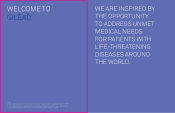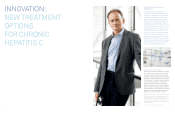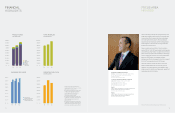Gilead Sciences 2012 Annual Report Download - page 7
Download and view the complete annual report
Please find page 7 of the 2012 Gilead Sciences annual report below. You can navigate through the pages in the report by either clicking on the pages listed below, or by using the keyword search tool below to find specific information within the annual report.
In the area of oncology, the company is
advancing novel therapies that target
key molecular signaling pathways and the
extracellular matrix involved in the growth
and survival of certain cancers for which exist-
ing treatment options are limited. Idelalisib
(GS-1101), a PI3K delta inhibitor, is currently
being evaluated in Phase 3 studies for indo-
lent non-Hodgkin’s lymphoma and chronic
lymphocytic leukemia. Simtuzumab is also
progressing through Phase 2 studies to assess
its safety and efficacy in treating pancreatic
and colorectal cancer, myelofibrosis and
certain fibrotic diseases. With the recent com-
pletion of the YM BioSciences acquisition, the
selective JAK inhibitor momelotinib (GS-0387/
CYT-387) was added to a growing oncology
and inflammation pipeline. A Phase 3 study of
momelotinib in myelofibrosis is planned for
the second half of 2013.
Increasing Access
Because many patients around the globe do
not have the resources to obtain the medi-
cines they need, we work to expand treatment
access wherever possible. The company’s
comprehensive patient assistance programs
provide medicines in the United States at
no cost for low-income, uninsured patients,
and co-pay assistance coupon programs
help those unable to afford the co-payments
associated with commercial health insurance
programs.
Gilead is also expanding access to its
medications in resource-limited parts of the
world—including developing countries where
the HIV/AIDS epidemic is affecting millions of
people. As of December 2012, approximately
3.5 million patients in the developing world
were receiving one of Gilead’s HIV medicines,
more than doubling the number of patients
reached since 2010.
Closing
In summary, the organization has a strong
business foundation, with over $9 billion in
revenues in 2012. And, we continue to make
significant progress in advancing new thera-
pies to solidify our future growth.
I would like to thank our employees for their
commitment to excellence and hard work.
I also would like to acknowledge the invaluable
input of our Board of Directors.
Thank you for your continued support. We
look forward to the year ahead—and to the
progress we believe we can make for many
more patients around the world.
John C. Martin, PhD
Chairman and Chief Executive Officer
Forward-Looking Statement
This Annual Report includes forward-looking statements regarding our clinical studies and product candidates, including the anticipated timing and achievement of certain
development milestones, regulatory filings and launches. Such statements are predictions and involve risks and uncertainties such that actual results may differ materially. Please
refer to Gilead’s Annual Report on Form 10-K for the year ended December 31, 2012 attached to this report for the risks and uncertainties affecting Gilead’s business. Gilead disclaims
any obligation to update any forward-looking statements in this report.
for adolescents and adults ages 15–65, and
will require that private insurers cover the cost
of screening.
Liver Diseases
With the Pharmasset acquisition completed
in January 2012, a leadership position was
established in the drug development for
chronic hepatitis C virus (HCV) infection. Over
the last year we have advanced the nucleo-
tide NS5B inhibitor sofosbuvir (GS-7977) and
a once-daily fixed-dose combination tablet
containing sofosbuvir and the NS5A inhibitor
ledipasvir (GS-5885) into Phase 3 testing. Our
goal is to transform the paradigm of HCV care
by developing an all-oral treatment regimen
that has higher cure rates, better tolerability
and greater convenience for patients than
currently available options.
In November 2012, the first data showing the
efficacy of sofosbuvir and ledipasvir plus riba-
virin were presented at The Liver Meeting, the
annual conference of the American Associa-
tion for the Study of Liver Diseases. Interim
results from a Phase 2 study suggested that a
12-week course of these medicines in patients
infected with genotype 1 HCV—the most com-
mon strain in the United States and the most
difficult to treat—resulted in 100 percent of
participants (n=25) remaining HCV RNA unde-
tectable four weeks after completing therapy
(SVR4). Phase 3 trials exploring sofosbuvir in
various combinations in genotype 1-6 patient
populations are ongoing. Initial regulatory
filings are expected in the first half of 2013,
and the appropriate commercial infrastructure
is now being assembled to support the potential
launch of sofosbuvir.
Also at The Liver Meeting, six-year clinical trial
data for Viread for the treatment of chronic
hepatitis B virus (HBV) infection was present-
ed, which showed sustained virological and
biochemical responses among patients, with
no evidence of viral resistance. These results
reinforce Viread ’s position as the most-pre-
scribed medicine for chronic HBV in the United
States and most European countries.
Cardiovascular, Respiratory
& Oncology/Inflammation
Across therapeutic areas, we look for ways
to appropriately expand the use of available
medicines and to advance investigational
therapies to address the unmet needs of
patients. In cardiovascular disease, Ranexa,
®
an oral late sodium current inhibitor that is
currently indicated for chronic angina, is also
being explored in Phase 3 studies for type 2
diabetes. In addition, a new generation of late
sodium current inhibitors are being developed,
such as GS-6615, which is currently in Phase 1
studies and has the potential to treat ischemic
heart disease and arrhythmias. In the area
of pulmonary arterial hypertension (PAH), a
Phase 4 research program has been designed
to advance the understanding of the disease
pathology and further define the clinical profile
of Letairis,
® including the potential for the
product to be used in combination with another
oral PAH treatment as frontline therapy.
In the area of respiratory disease, Cayston,
®
an inhaled antibiotic approved to treat cystic
fibrosis (CF) patients with Pseudomonas
aeruginosa, is being evaluated in Phase 3
studies to assess its efficacy in treating
bacterial infections associated with non-CF
bronchiectasis. Results from these trials are
expected in 2013.
In addition, we are evaluating GS-5806 in
Phase 2 clinical trials. This compound has been
shown in preclinical studies to block respiratory
syncytial virus (RSV). RSV is a pathogen that
infects the human respiratory tract, leading to
bronchiolitis and pneumonia. It is estimated
that 125,000 newborns are hospitalized with
RSV every year in the United States.
10 11















